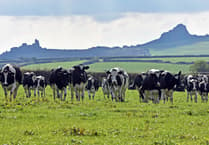With Glyn Roberts, FUW president
MANY of us will have watched the G7 leaders come together in Cornwall a few weeks ago to discuss a myriad of issues, and while the official focus was on tackling the Covid pandemic, climate change and concerns over Russia and China, the Prime Minister came under huge pressure over his proposal to break international law by failing to honour the Northern Ireland Protocol he agreed to and implemented just months ago.
Wanting to break an international treaty just months after it has come into effect because warnings about implications and the need to prepare were ignored shows just how careful governments should be when signing international agreements.
Just such an agreement was the focus of talks between the UK and Australian PMs in the periphery of the G7, in the form of a UK-Australia trade deal, and on 15 June the UK government announced, with great fanfare, that an agreement in principle had been reached.
For Welsh farmers, the details of what might be in such a deal have been a major concern for months, with fears over lower production standards and costs in Australia.
The UK Government have published figures which mean an immediate tenfold increase of the current beef import quota at the same time as a doubling of the current lamb quota.
In recent weeks, the FUW has held back-to-back meetings with ministers, MPs and others about the deal, and has written to the PM and Welsh Affairs Committee, asking them to ensure thorough scrutiny of the proposals and to reject anything that compromises family farms, animal welfare, food security and standards and our global environment.
During the process of assessing the merits or otherwise of the proposed deal, MPs should consider carefully why the Australian Government placed food exports at the top of its press statement, including quota figures, while the UK Government held those details back for two days.
Whatever a final deal looks like, MPs must also consider that international treaties are things they and future governments will have to live with for a very long time - to coin a phrase, they are ‘for life, not just for Christmas’.
If the concerns expressed by the FUW and many others are not realised then fine. But if they turn out to be right, be it in two or 10 years, and we are locked into an irreversible deal with only rudimentary safeguards, there will be little a government or parliament will be able to do without taking drastic action that may breach WTO rules.
For this reason, whatever the final deal looks like, we need a belt and braces mechanism such as a break clause that, if the worst comes to the worst, allows the UK Government or Parliament to step in to protect our family farms, animal welfare, food security and standards and our global environment.



.jpeg?width=209&height=140&crop=209:145,smart&quality=75)

Comments
This article has no comments yet. Be the first to leave a comment.